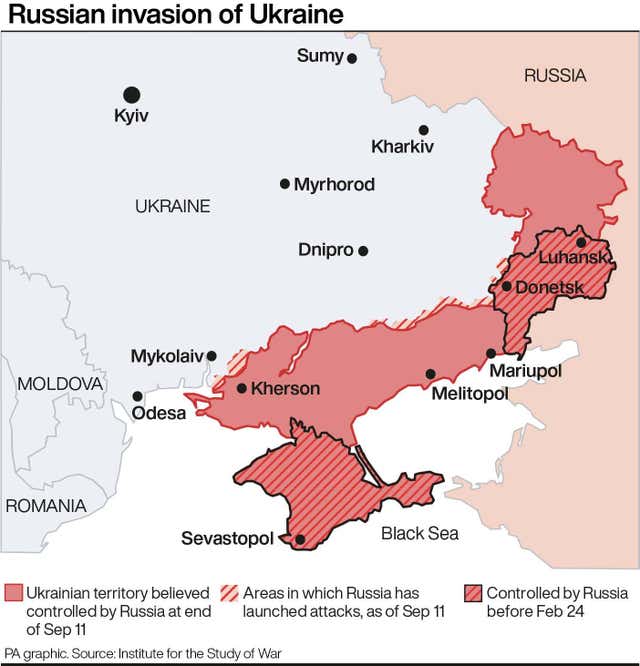Pro-Moscow officials say occupied areas have voted to join Russia
The ballots asked residents whether they wanted the areas to be incorporated into Russia.

Pro-Moscow officials said that residents in the four occupied areas of Ukraine have voted to join Russia in a Kremlin-orchestrated vote that has been dismissed by the US and Western allies as illegitimate.
According to Russia-installed election officials, 93% of the ballots case in the Zaporizhzhia region were in support of annexation, as were 87% of ballots in the southern Kherson region, 98% in Luhansk and 99% in Donetsk.
The preordained outcome sets the stage for a dangerous new phase in Russia’s seven-month war in Ukraine because it is expected to serve as a pretext for Moscow to annex the four areas. That could happen as soon as Friday.
In a remark that appeared to rule out negotiations, Ukrainian president Volodymr Zelensky told the UN Security Council by video from Kyiv that Russia’s attempts to annex Ukrainian territory will mean “there is nothing to talk about with this president of Russia”.

The ballots asked residents whether they wanted the areas to be incorporated into Russia.
Moscow-backed officials in the four occupied regions in southern and eastern Ukraine said polls closed on Tuesday afternoon after five days of voting.
Russian president Vladimir Putin is expected to address Russia’s parliament about the referendums on Friday, and Valentina Matviyenko, who chairs the parliament’s upper house, said lawmakers could consider annexation legislation on October 4.
Meanwhile, Russia ramped up warnings that it could deploy nuclear weapons to defend its territory, including newly acquired lands, and mobilising more than a quarter of a million more troops to deploy to a front line of more than 620 miles.
Many Western leaders have called the referendum a sham, and the UN Security Council was scheduled to meet later in New York to discuss a resolution that says the voting results will never be accepted and that the four regions remain part of Ukraine.
Russia is certain to veto the resolution.
The balloting and a call-up of Russian military reservists that Mr Putin ordered last Wednesday are aimed at buttressing Moscow’s exposed military and political positions.
The referendums follow a familiar Kremlin playbook for territorial expansion. In 2014, Russian authorities held a similar referendum on Ukraine’s Crimean Peninsula, under the close watch of Russian troops.

Mr Putin has been talking up Moscow’s nuclear option since Ukrainians launched a counteroffensive that reclaimed territory and has increasingly cornered his forces. A top Putin aide ratcheted up the nuclear rhetoric on Tuesday.
“Let’s imagine that Russia is forced to use the most powerful weapon against the Ukrainian regime that has committed a large-scale act of aggression, which is dangerous for the very existence of our state,” Dmitry Medvedev, deputy head of the Russian Security Council that Putin chairs, wrote on his messaging app channel.
“I believe that Nato will steer clear from direct meddling in the conflict.”
The United States has dismissed the Kremlin’s nuclear talk as a scare tactic.
The referendums ask residents whether they want the areas to be incorporated into Russia, and the Kremlin has portrayed them as free and fair, reflective of the people’s desire for self-determination.
Tens of thousands of residents had already fled the regions because of the war, and images shared by those who remained showed armed Russian troops going door-to-door to pressure Ukrainians into voting.
Mariupol Mayor Vadym Boychenko, who left the port city after the Russians seized it after a months-long siege, said only about 20% of the 100,000 estimated remaining residents cast ballots in the Donetsk referendum. Mariupol’s pre-war population was 541,000.
“A man toting an assault rifle comes to your home and asks you to vote, so what can people do?” Mr Boychenko asked during a news conference, explaining how people were coerced into voting.
Western allies sided firmly with Ukraine, dismissing the referendum votes as a meaningless sham.
British Foreign Secretary James Cleverly said the ballots were “a desperate move” by Mr Putin. French Foreign Minister Catherine Colonna said while visiting Kyiv on Tuesday that France was determined “to support Ukraine and its sovereignty and territorial integrity”.
She described the ballots as “mock referendums.” Ukrainian officials said Paris and Kyiv had moved closer to an agreement that would supply Ukrainian forces with French Caesar artillery systems.





